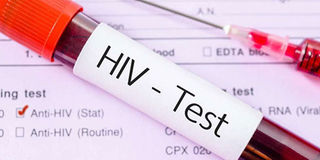Remarkable progress: 94pc of Kenyans living with HIV aware of their status

Advances in antiretroviral therapy (ART), which limits the virus but does not kill it, mean that more people than ever are able to live full lives despite being HIV-positive. PHOTO| FOTOSEARCH
What you need to know:
- The number of people living with HIV/Aids who know their status has increased dramatically over the past eight years, rising from 29 per cent in 2015 to an impressive 94 per cent in 2023, marking one of the most significant achievements in Kenya's public health history.
Kenya is one percentage point away from meeting the United Nations Programme on HIV/AIDS (UNAIDS) target of having 95 per cent of people living with HIV aware of their status, a new report has revealed.
According to the State of HIV Results Report by the Global Fund 2024, the number of people living with HIV/Aids who know their status has increased dramatically over the past eight years, rising from 29 per cent in 2015 to an impressive 94 per cent in 2023, marking one of the most significant achievements in Kenya's public health history.
This progress, the report notes, is in line with the UNAIDS Fast Track Strategy and the United Nations Declaration, which aims for 95 per cent of people living with HIV to know their status, 95 per cent of those who know their status to be on treatment, and 95 per cent of those on treatment to achieve viral suppression by 2030.
The report attributes Kenya's remarkable progress to years of strategic interventions, community-driven efforts and technological innovations that are transforming HIV testing and education.
"Investments in health infrastructure, low-cost testing solutions and programmes such as the Global Fund and PEPFAR have made services more affordable and accessible, especially in low-income and rural areas," the Global Fund said in the report.
Similarly, public health campaigns have played a crucial role in normalising HIV testing, with slogans such as "Know Your Status" widely promoted through television, social media and local events. Influencers and celebrities have also shared personal stories to reduce stigma and encourage testing. Mobile testing units and self-testing kits have made services available in underserved areas, while routine HIV testing in health centres has helped remove barriers to access.
“HIV testing has become more accessible than ever. Mobile testing units brought services to rural and underserved areas, while self-testing kits empowered individuals to check their status privately. Health centers incorporated HIV tests into routine care, normalising the process and reducing barriers,” the report states.
The report further shows that the HIV incidence rate per 100,000 people dropped from 192 in 2010 to 31 in 2023, while the proportion of people living with HIV on treatment increased from 86 per cent in 2015 to 96 per cent in 2023, while 91 percent now have a suppressed viral load.
Similarly, there has been remarkable reductions in new HIV infections, HIV-related mortality and mother-to-child transmission by 78 per cent, 68 per cent and 65 per cent respectively.
Nearly 1.4 million people living with HIV in Kenya are currently receiving life-saving treatment in decentralised facilities. This progress has relieved pressure on primary care clinics and hospitals, allowing them to treat other diseases.
"By reducing the burden of HIV/Aids, we are freeing up capacity in primary care clinics and hospitals to treat other diseases. When people with symptomatic HIV do not receive appropriate care, their health needs increase and health systems are put under additional strain to meet their needs. Investing in HIV can reduce the number of people infected and the health needs of people living with malaria," the Global Fund said.
Meanwhile, a revolutionary drug that is 100 per cent effective in preventing HIV infection is expected to be available in Kenya as early as next year. The drug – lenacapavir - which costs about Sh5,000 a year, not only prevents HIV infection but also helps to suppress the virus in those already infected.
To boost financial support for the fight against HIV, Kenya signed a Sh30.1 billion ($232.6 million) grant agreement with the Global Fund in June to finance HIV/Aids interventions from July 2024 to June 2027. This funding is expected to help sustain the progress made and further reduce HIV incidence, mortality and treatment gaps.
Since 2002, Kenya has received a total of Sh133.5 billion ($1.03 billion) from the Global Fund to strengthen its health systems and fight HIV/Aids and malaria, demonstrating the country's commitment to ending these epidemics.



